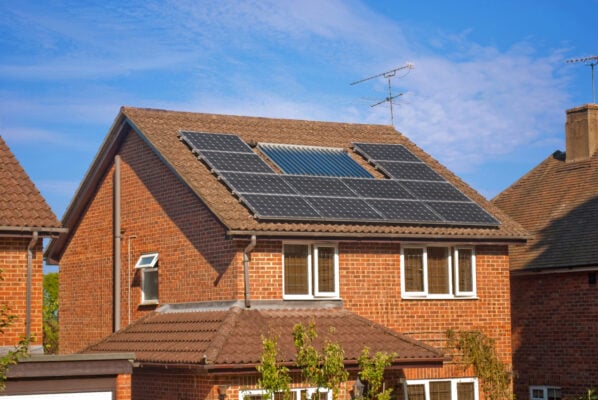Financing Solar Panels in the UK: Your Guide to Affordable Solar Energy
Representative example: If you borrow £34,000 over 15 years at a rate of 8.26% variable, you will pay 180 instalments of £370.70 per month and a total amount payable of £66,726.00. This includes the net loan, interest of £28,531.00, a broker fee of £3,400 and a lender fee of £795. The overall cost for comparison is 10.8% APRC variable. Typical 10.8% APRC variable

Representative example: If you borrow £34,000 over 15 years at a rate of 8.26% variable, you will pay 180 instalments of £370.70 per month and a total amount payable of £66,726.00. This includes the net loan, interest of £28,531.00, a broker fee of £3,400 and a lender fee of £795. The overall cost for comparison is 10.8% APRC variable. Typical 10.8% APRC variable
With rising energy costs and a growing focus on sustainability, more UK homeowners are turning to solar power to reduce their electricity bills and carbon footprint.
However, the initial cost of installing solar panels can be a significant barrier.
Fortunately, various financing options are available to make solar energy more accessible. This guide explores different ways to finance your solar installation, including pay-monthly options, government grants, loans, and community initiatives.
Why Invest in Solar Energy?
Before diving into financing options, it’s essential to understand the benefits of installing solar panels:
- Lower Energy Bills: Solar panels generate free electricity, reducing your reliance on the grid and lowering your monthly bills.
- Environmental Benefits: By switching to renewable energy, you reduce your carbon footprint and contribute to a greener planet.
- Increased Property Value: Homes with solar panels are often more attractive to buyers and can have higher resale values.
- Government Incentives: Various schemes and tax breaks make solar installation more affordable.
- Energy Independence: With a battery storage system, you can store excess energy for use at night or on cloudy days, reducing reliance on energy suppliers.
- Protection Against Rising Energy Costs: As energy prices continue to rise, having a solar system can shield you from unpredictable price increases.
1. Pay-Monthly Solar Finance Plans
One of the most popular ways to finance solar panels is through pay-monthly plans offered by companies like Heatable.
These plans allow homeowners to spread the cost over several years, making solar installation more affordable without requiring a large upfront investment.
How Do Pay-Monthly Solar Plans Work?
- Low or No Deposit: Some providers allow you to start your solar installation with minimal or no upfront costs.
- Flexible Repayment Terms: Financing options typically range from 3 to 10 years, allowing homeowners to choose a plan that fits their budget.
- Competitive Interest Rates: Many solar finance providers offer low-interest rates, making monthly payments manageable.
- Overpayment Options: Some plans allow early repayment without penalties, helping homeowners pay off their solar investment sooner.
- Immediate Savings: With a well-structured finance plan, your monthly solar repayment may be lower than your existing electricity bill, leading to immediate savings.
2. Solar Panel Subscription Models
Subscription-based solar panel financing is a newer model gaining popularity in the UK. Companies like Sunsave offer a solar-as-a-service model, where homeowners pay a monthly fee for solar panel installation and maintenance.
Advantages of Solar Subscriptions
- No Upfront Costs: Installation is covered by the provider, removing financial barriers.
- Maintenance Included: The provider takes care of system maintenance and repairs, ensuring long-term efficiency.
- Predictable Monthly Payments: Instead of a large initial investment, homeowners pay a fixed monthly fee for their solar energy system.
- Potential Battery Integration: Some subscription plans include battery storage, enhancing energy efficiency.
This option is ideal for those who want to enjoy the benefits of solar energy without committing to ownership.
3. Personal Loans and Green Mortgages
If you prefer to own your solar panels outright but need financial assistance, personal loans and green mortgages are excellent options.
Personal Loans for Solar Panels
- Secured and Unsecured Loans: Homeowners can choose between secured loans (backed by property or assets) or unsecured loans (based on creditworthiness).
- Competitive Interest Rates: Banks and credit unions offer loans with varying interest rates, depending on credit history.
- Flexible Terms: Repayment periods typically range from 2 to 10 years.
- Quick Access to Funds: Personal loans are usually processed faster than mortgage-based solutions, making them a quicker option for financing.
Green Mortgages and Home Improvement Loans
Several UK banks offer green mortgages and home improvement loans with cashback incentives for eco-friendly upgrades:
- Lloyds Bank & Halifax: Offer up to £1,000 cashback for solar panel installations.
- Santander & Virgin Money: Provide incentives for energy-efficient home improvements.
- Nationwide & Barclays: Offer preferential rates on home improvement loans if the funds are used for green home upgrades.
4. Government Grants and Schemes
The UK government supports renewable energy adoption through various grants and incentive programs.
The ECO4 Scheme
The Energy Company Obligation (ECO4) scheme helps low-income households improve energy efficiency. Eligible homeowners can receive grants to cover solar panel installation costs.
The Home Upgrade Grant (HUG)
This program offers financial assistance to off-grid homes looking to install renewable energy solutions, including solar panels.
VAT Reduction on Solar Panels
To encourage renewable energy adoption, the UK government has reduced VAT on solar panels to 0% until April 2027. This effectively provides a 20% discount on installation costs.
The Smart Export Guarantee (SEG)
Under the SEG scheme, homeowners can sell excess electricity generated by their solar panels back to the grid. This provides an additional financial incentive, reducing the payback period for your solar investment.
5. Community Solar Initiatives
Local councils and community groups often run collective solar buying programs to make installations more affordable.
Solar Together Scheme
This initiative groups homeowners together to purchase solar panels at discounted rates through bulk buying. It’s an excellent option for those looking for cost-effective solutions with minimal hassle.
Local Authority Support
Some local councils offer additional grants or low-interest loans for homeowners installing solar panels. Check with your local authority for available programs.
Choosing the Right Solar Financing Option
When selecting a financing option, consider the following factors:
- Upfront Costs: Determine whether you can afford an initial deposit or if you prefer a zero-deposit plan.
- Monthly Payments: Ensure that the repayment plan fits your budget.
- Ownership vs. Subscription: Decide whether you want to own your solar panels outright or opt for a subscription model.
- Eligibility for Grants: Check if you qualify for government incentives to reduce costs.
- Return on Investment: Assess how quickly your savings on energy bills will offset the installation cost.
Conclusion
Investing in solar energy is a smart financial and environmental decision, and there are numerous financing options available to suit different budgets and needs.
Whether you choose a pay-monthly plan, a solar subscription model, a personal loan, or take advantage of government grants, making the switch to renewable energy has never been more accessible.
By exploring these options, UK homeowners can reduce their energy bills, lower their carbon footprint, and increase their property value without breaking the bank.
